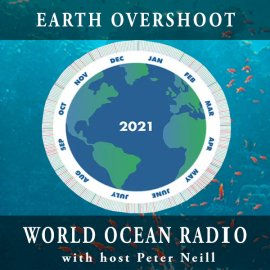Earth Overshoot 2021
-
English
-
ListenPause
[intro music]
Welcome to World Ocean Radio…
I’m Peter Neill, Director of the World Ocean Observatory.
Earth Overshoot Day marks the date when humanity has exhausted nature’s budget for the year. In 2021, Earth Overshoot Day landed on July 29. For the rest of the year, then, we are maintaining an ecological deficit, by drawing down local resource stocks and accumulating carbon dioxide in the atmosphere. We are operating in overshoot.
The Global Footprint Network is the source of this determination. It describes its method as follows: “We calculate the number of days of that year that Earth’s biocapacity suffices to provide for humanity’s Ecological Footprint. The remainder of the year corresponds to global overshoot. Earth Overshoot Day is computed by dividing the planet’s biocapacity (the amount of ecological resources Earth is able to generate that year), by humanity’s Ecological Footprint (humanity’s demand for that year), and multiplying by 365, the number of days in a year.
The Global Ecological Footprint and biocapacity metrics are calculated using annual United Nations statistics, these accounts incorporate the latest data and the most updated accounting methodology. The method has been criticized as not all inclusive, but even the skeptical scientists concur that “the initiative has value in its simplicity as a way of increasing awareness about the impacts of human activities on ecosystems and the planet.”The point of the calculation is clear: we are consuming more that the earth can produce, running at an ever-increasing deficit and non-renewable depletion of the global natural resources on which we rely to survive. In 1970, Earth Overshoot Day was December 30; in 2021, it was July 29 – five months earlier – an astonishing increase in our rate of consumption of almost 50% over 50 years. And here’s another shocking factoid from the NY Times: “If the whole world consumed like the United States, we would have hit Overshoot Day on March 14 this year, that is, we would have tapped out our natural asset supply only 79 days into the year, with the remainder of our demand to come from unsustainable capacity. Do the math. If your personal resources reflected such pattern, on the Ides of March you would be bankrupt, destitute, and a burden for others to bear, at least until the end of July, when the rest of us would join you in a homeless, foodless, waterless, futureless state of despair.
Let me try another example. Let’s say you are fishing the ocean for tuna, that has become more and more popular beyond Japan to an international taste for a product that can only and maintain supply at a certain level of reproduction and catch. If, in response to an exponential demand for tuna fish salad and sushi, you supplement your historical supply by fishing more boats, by fishing farther, by taking younger fish from the reproductive cycle, by raising your prices, and by breaking the rules meant to protect the asset for all, you will have put into play an inevitable outcome whereby the natural supply is exhausted, demand is not met, and your livelihood is lost in that moment, probably forever. That is exactly what is happening to tuna today. And to other species as well. We are willfully overshooting our sustainable capacity for sandwiches and sashimi by exhausting the resource on which that capacity depends.
Now, multiply that reality by other species of fish under similar pressure. Add to this the new circumstances of climate change, unstable weather conditions, energy costs, pandemic, crime, misinformation, and public indifference, and you have a perfect slurry for disaster, a market recipe for collapse. And just in seafood alone, upon which some 40% of the world population relies for significant protein. What about all the other things we grow and drink and need to meet our basic needs? What about what little, if any, will be left for our children?
Do we know? Do we care? Do we over-shoot because that is what we deserve? Do we continue to pursue our future with our eyes closed, and our bellies full, until they aren’t? Do all these statistics and measurements mean nothing? Is the science ignored because it does not affirm our entitlement? Does the future matter? Apparently not, as every year, we consume more, faster, and the earth gives up its wealth toward a point where there will be no more to take. 2022 is but six months away, and we are already running on empty. Earth Overshoot is a critical warning, a global calculation of a reality that inexorably declines, month by month, year by year, and we are deaf, dumb and blind to the alarm and clarion call.
We will discuss these issues, and more, in future editions of World Ocean Radio.
[outro music]
This week on World Ocean Radio we're discussing Earth Overshoot Day 2021 which landed on July 29th, meaning we are running an ecological deficit between now and the end of the year. The calculation is clear: we are consuming more than the earth can produce, overshooting our sustainable capacity by exhausting the resources upon which we all depend.
About World Ocean Radio
Since 2009, World Ocean Radio is a weekly 5-minute podcast covering a broad spectrum of ocean issues from science and education to advocacy and exemplary projects. World Ocean Radio, a project of the World Ocean Observatory, is available for syndicated use at no cost by college and community radio stations worldwide. Contact director@thew2o.net if you are interested in becoming an affiliate or know of a radio station that should be broadcasting these episodes each week.
Resources from This Episode:
overshootday.org
#MoveTheDate
Twitter: @EndOvershoot
Facebook: @GlobalFootprintNetwork
LinkedIn: global-footprint-network
Instagram: globalfootprintnetwork
- Login to post comments



